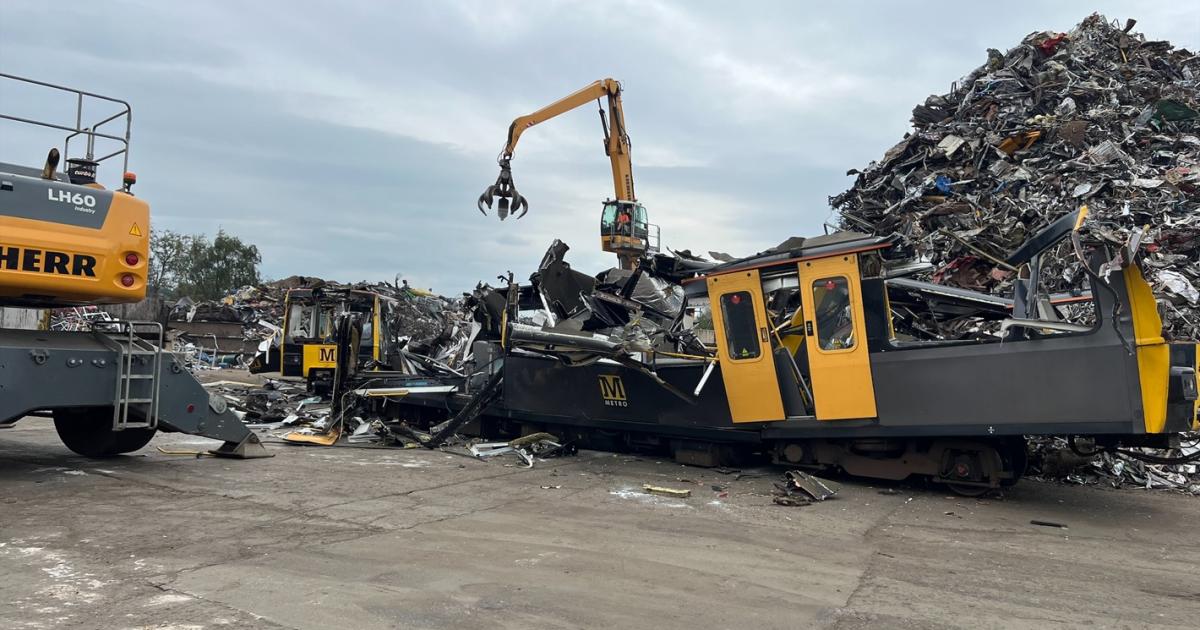The trains, part of a 45-year-old fleet now being replaced, are being dismantled and recycled to recover metals that will be repurposed for manufacturing and construction industries across the globe.
Paul Welford, major projects director at Nexus, said: “We’re bidding a fond farewell to the old Metro train fleet over the next couple of years and it’s good to see that a lot of the used parts are being sent away for recycling.Twenty nine trains have already been recycled (Image: Supplied)
“A lot of the metals are harvested during this process and they are repurposed to support other industries, usually manufacturing and construction, quite often overseas.
“Overall, this reduces the energy and carbon consumed if such metals were manufactured from scratch.”
The recycling operation is taking place at J Denham Metals Ltd’s yard near Bishop Auckland, where the trains are stripped for aluminium, copper and steel.(Image: Supplied)
So far, 29 trains—nearly a third of the fleet—have been recycled.
Each train is signed out of service at the Howdon Metro Depot in North Tyneside and then transported by road to County Durham.
Once at the yard, powerful hydraulic machinery dismantles the carriages in under an hour, separating valuable materials for export to countries including Spain, India, Turkey and several in Asia.
Graeme Smith, commercial manager at J Denham Metals, said: “It’s great for us to be involved in the Metro project.Powerful machinery dismantling the carriages (Image: Supplied)
“These trains are part of our region’s heritage and we’re proud to be carrying out the recycling work given the region’s railway heritage and nearby Shildon is the home of rail.
“These are the first passenger trains that we’ve decommissioned and the most high profile.
“We regularly get train enthusiasts coming down here just to catch a final look at the Metros before they undergo the breakage process.(Image: Supplied)
“It’s often described as scrappage, but much of the metals we strip away from the trains will be re-used.
“It gets transported on, often for use in construction and manufacturing across the world.
“There has been more demand for recycled metals in recent years, so the materials removed from these Metro trains is providing an important environmental benefit.(Image: Supplied)
“The process of taking the trains apart does look brutal, but it’s very necessary for the recycling process.
“We can break a Metro train apart completely in just under one hour.
“Just days after it may have left service, it’s quickly broken down, and is a part of a batch of used metals ready to repurpose, whether that’s the steel, copper or aluminium from its bodywork and its chassis.”(Image: Supplied)
Nexus is preserving two of the old carriages for heritage purposes.
One will go to the Stephenson Steam Railway in North Tyneside, and the other to Beamish Museum in County Durham.
The rest are making way for the new fleet of 46 Stadler-built trains, 25 of which have already arrived.
The first new trains entered passenger service in late 2024, with full rollout expected by the end of 2026.
READ MORE:
Paul Patrick, managing director of Stadler Rail Service UK, said: “Saying goodbye to the old trains is a bitter-sweet moment for Stadler, particularly as several members of our staff—myself included—worked on these trains for a long time.
“But they’ve served the region very well and it’s time to look forward.
“Sad though it can be to see them withdrawn from service, we’re really pleased that they’re being disposed of sustainably and responsibly and that some of the metal from them will get a second life and go on to support other industries.”
